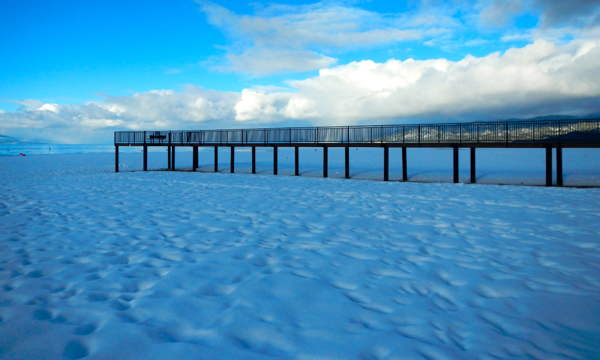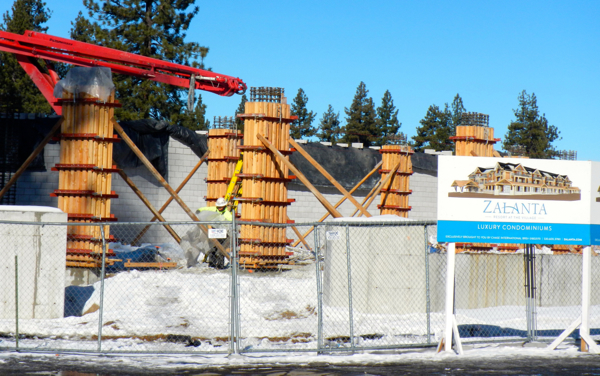Climate change impacting Tahoe real estate
By Anne Knowles
While signs of climate change may be everywhere around Lake Tahoe in recent years — warmer days and low snowpack, exposed piers and dry trees — the effect on real estate values is hard to see.
But it’s not hard to imagine, based on studies demonstrating the probable impact of global warming on home prices.
While the basin is vulnerable to some of the worst effects such as wildfire and higher temperatures leading to a meltdown in winter tourism, it could also be buoyed by its stronger summer season, its limited inventory of property and its easy accessibility for well-heeled visitors and investors from California.

While piers are desirable to investors, today most at Lake Tahoe don’t have water under them. Photo/Kathryn Reed
“I’m not seeing any pushback from it yet,” said Deb Howard, owner of Deb Howard & Co. and 2014 director of the California Association of Realtors and a member of CAR’s committee on the environment. “But climate change and how we conserve and adapt is on the mind of the real estate industry.”
Currently, the market is still rebounding from the recession. Median home prices in South Lake Tahoe area, for example, have been rising for three years after six years of steady declines. In October 2015, the median sale price for a single family home was $360,000, almost exactly halfway between a recent low of $234,000 in August 2012 and the high of $489,000 in March 2006, according to the South Tahoe Association of Realtors.
In the condo market, new product is hitting the market for the first time in 30 years, including developments at Martis Camp, Tahoe Beach Club and Homewood Mountain Resort, said Sue Lowe, senior vice president and corporate broker for Chase International in Zephyr Cove and Incline Village.
“We’re overwhelmed with calls on Zalanta,” said Lowe. “We already have 18 reservations for 30 units and it’s been on the market for three weeks.”
Zalanta Resort at the Village is the rechristened Chateau at Heavenly Village project, the second phase of which will include 32 condos scheduled for completion next year.
“What drives the market now is people buying second homes,” said Carl Fair, broker-owner of Century 21 at Tahoe Paradise. “Everybody wants to buy rental properties.”
That trend, Fair told Lake Tahoe News, started with Home Away, an online rental site which now owns one-time competitor VRBO, and more recently by Airbnb, another increasingly popular vacation rental site.
In 2015, well over half the homes owned in Douglas, Washoe, Placer and El Dorado counties were second homes, according to a Tahoe Prosperity Center report called Measuring for Prosperity.
But real estate brokers say it’s higher than that.

Zalanta in South Lake Tahoe will be a hotel-condo project with 32 units coming online in 2017. Photo/Kathryn Reed
“It’s more like 70 to 80 percent. In Glenbrook only 10 percent of the homes are primary residences,” Lowe told Lake Tahoe News.
Some brokers think that helps insulate Lake Tahoe.
“I believe that the appeal of the mountains, and in particular, of our gorgeous lake, will only be affected by the economy and not by drought or wildfire,” said Bonnie Gaines, chief operating officer and broker with Buckingham Vacation Rentals. “The wealth of the workers in the Bay Area and now the insurgence to the work force in Reno, can only make Lake Tahoe more desirable as a getaway place for city folks.”
That, of course, remains to be seen in light of climate change.
At the high end, lack of a pier or the ability to use an existing one can reduce the price tag on a home by up to $1 million, said Lowe.
“Lack of precipitation does affect the price because it restricts lakefront homeowners’ piers,” said Lowe. “And I’ve got clients who only want a home with a pier.”
Investors may be less easily deterred, but there are increasing risks under many climate change scenarios. Wildfires, for instance, are increasing throughout the west and the wildfire season is lasting longer.
A recent report by the U.S. Forest Service found that home prices drop about 10 percent after a single, close by wildfire and 23 percent after a second.
Investors may be less risk averse than homeowners who live there, but if fires routinely reduce visitor traffic, property becomes less appealing. Tuolumne County, for example, lost an estimated $300,000 in transient occupancy taxes from the 2013 Rim Fire in Yosemite National Park, according to the SMG Consulting 2015 Tourism Outlook.
In the long term, the biggest impact could come from reduced snowpack. Snow as a percent of total precipitation has declined from 51 percent in 1910 to 36 percent now and could go to 10 percent by the end of the century, according to a UC Davis report, Tahoe: The State of Climate Change.
Ellen Hanak, a senior fellow at the Public Policy Institute of California and director of its Water Policy Center, helped write a report for the Federal Reserve on the effect of climate change on housing prices near ski resorts, which looked at Colorado, and north and south Lake Tahoe.
The report found Lake Tahoe was more vulnerable because of its lower elevation with more days above freezing.
“What was key was the share of precipitation falling as rain. Rain is not only bad for winter sports, but it ruins what snow you have,” Hanak told Lake Tahoe News. “If you look at 2050, with average rises in temperature, housing prices will drop from between 30 to 49 percent based on this one issue alone.”
But that also means other things could boost the price, like low inventory or the summer season.



:-p
Or because the valley temps will be roasting, foothill lakes and reservoirs will be parking lots, our lake is 1600 feet deep and going nowhere, mountain summer temps will be in the 80-90s, I predict real estate prices will continue to soar in Tahoe.
The reality is that a traditional Tahoe winter is challenging to live in. People may dream of retiring here, but it is a lot of work. If Tahoe continues to warm with snows mostly at upper elevations and rain at the lake, then Tahoe home values will explode. What more could you want? Skiing up high, no shoveling and immaculate summers.
I hope that is not the case as I enjoy real Tahoe winters but it’s looking more and more likely.
I long for the days when houses were homes and not investments or bragging chips because of the location.
This article seems to pick and choose the facts to meets its headline. The headline implies that climate change is affecting real estate pricing as a whole now, but is not backedup by facts. Yes the high ends with peirs may be hurt, but the vast majority of properties dont have those. Question, would home prices go up with a wider beach? Propably. Then they quote a report that vales may drop up to 40%, but home values are not that simple to prodict, 5here are too many varibles, most notibly supply and demand and the economy.
OMG!
Should we bail out the Realtors?